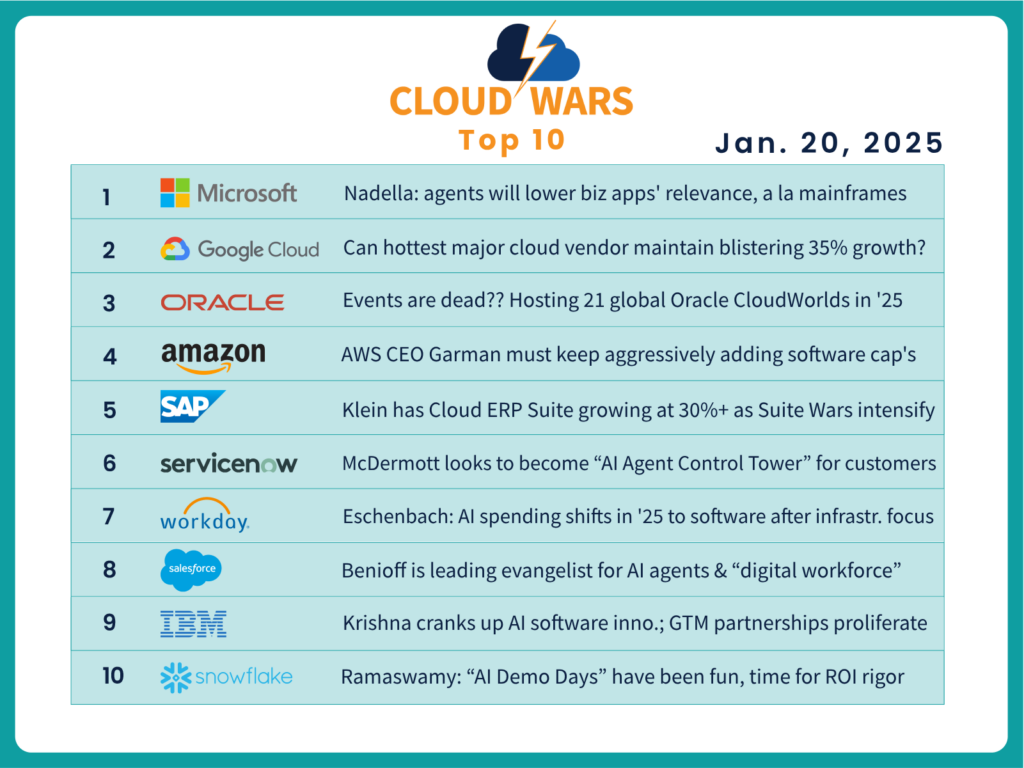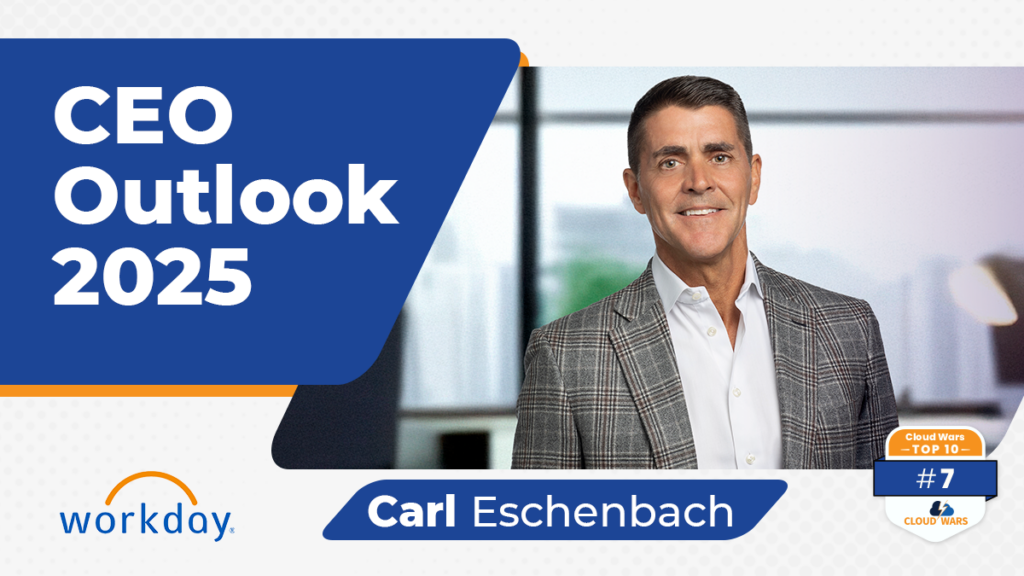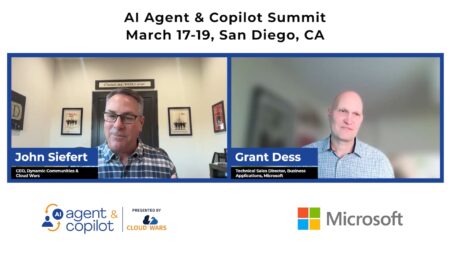
While AI spending on business applications and related solutions will increase significantly in 2025, customers are demanding that tech vendors must be able to demonstrate clear and quantifiable ROI around productivity gains, says Workday CEO Carl Eschenbach.
In our recent interview for this ongoing Cloud Wars CEO Outlook 2025 series, Eschenbach said business leaders are willing and eager to invest in AI-powered business applications, purpose-built solutions, and agents, but only if those leaders can clearly see a very rapid payoff.
“I think we’re moving from an experimental phase to a phase where people are now looking to implement this technology and do it in a way where it’s driving real business value,” Eschenbach said in our Zoom interview (you can see the full interview here).
“There’s a lot of questions around AI in the enterprise and the pace of its adoption. Today, a lot of the money being spent on AI is at the infrastructure level. In 2025, we’ll start to move into the software layer, in the application layer — but as I spend time with the enterprise and the C-suite out there, they’re saying, ‘We want to implement it, but we now need to make sure there’s a return on investment we’re getting, and there’s a total cost of ownership and a productivity gain,” Eschenbach said.
“Because in the last couple years, people have implemented it, but they can’t really show the ROI associated with it.”
And as customers crank up the scrutiny about their AI investments, the primary determining factor will be data, primarily related to the quality, security, access and relevance of the data. In that context, Eschenbach believes that Workday will be in a strong position to gain the confidence and trust of these more-discriminating buyers because of the company’s long history with AI and its unified model.
“As we move from this experimental phase into this new phase of people deploying it, customers are going to look to go to trusted partners, partners they have an existing relationship with, partners that they know have a highly curated set of data AI. We talk a lot about AI, but your output of your AI is only as good as the data that you’re training it with, and we have the best data set in the world, and many want access to our data set to drive those outcomes.”
Customers Driving Vendor Consolidation
The market dynamics around data quality as an indispensable element for AI success are spurring customers to focus more of their 2025 software spending on a smaller number of vendors that are able to meet the more-demanding standards Eschenbach described.
Business leaders are “looking to consolidate a lot of their point solutions onto platforms,” Eschenbach said, “and we’re seeing more and more customers say, ‘How do we leverage the investment we have in Workday to consolidate more and more of these point solutions to drive economies of scale and get a better total cost of ownership?’ And I think we’re super positioned to be the consolidator of all these point solutions and stop that sprawl from happening.”

AI Agent & Copilot Summit is an AI-first event to define opportunities, impact, and outcomes with Microsoft Copilot and agents. Building on its 2025 success, the 2026 event takes place March 17-19 in San Diego. Get more details.
Platform Power
A big trend in 2025 is the move by companies such as Workday from being primarily applications vendors to being platform vendors that also have large and highly capable suites of applications. As Eschenbach sees it, Workday’s platform capabilities are enhancing its ability to be one of the core software vendors on which that consolidation happens.
“We know how to deploy at scale across the biggest companies in the world, which gives us a leg up versus our competition, who at times have very complex data sets and environments, and they can’t implement at the speed and pace and at the dollar value that Workday can,” Eschenbach said.
“So I think it’s the strength of the technology, both at the platform level and the applications, and then our ability to deliver on time. And because we’re a platform, and there’s much more being consolidated on us.” (You can see the full interview with Eschenbach here).
Agents Boosting ROI
On the subject of AI agents and ROI, Eschenbach said Workday’s Recruiter Agent is demonstrating the type of quantifiable ROI metrics that customers are demanding.
“In the HR world, recruiting is one of your biggest costs, and in the last two quarters our Recruiter Agent has seen accelerated growth because there is a tangible ROI and productivity gain that can be seen,” Eschenbach said.
“Our customers who’ve deployed our Recruiter Agent actually are seeing upwards of a 50% productivity gain in recruiting — and that is absolutely something people will pay for. At the same time, it helps accelerate their onboarding or hiring of new employees by up to 30%.
“Those are the types of results customers are looking for to justify moving towards these AI solutions as opposed to just kicking the tires and doing all these experimental things we’ve seen over the last couple of years. This is why I talked about having solutions around AI that can drive tangible evidence of value back into your customers, and that’s what we’re focused on doing.”
In Workday’s case, being in the HR and Financials markets is nicely aligned with customers’ investment priorities, Eschenbach said.
“And I think both across HR and finance, those are two functions in the enterprise that are going to actually start to see true benefits from AI more than many other departments.”
Huge Rewards for Those That Can Deliver
Customers are 100% correct in demanding that software vendors back up the widespread hype about AI with real-world commitments for great business outcomes. And for the software companies that can convince customers of their ability to deliver truly transformative AI-powered business outcomes, the financial rewards will be enormous.
“So it’s going to be a really interesting 2025,” Eschenbach said.
“I know there’s a lot of talk about the size and scope of the investment customers are going to make in AI. But when you look at the overall budget for technology, AI is still a small portion of it, but it’s also the fastest-growing.
“And I think there are companies like Workday that are uniquely positioned to take advantage of that hypergrowth.”










